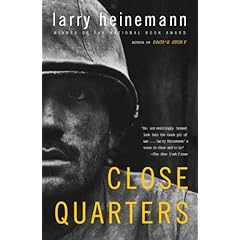 The back cover reads:
The back cover reads:Like many other recent high-school graduates in the 1960’s, Philip Dosier found that if he didn’t have plans for himself, his country certainly did. Shipped off to Vietnam to fight in a war he knew next to nothing about, he found himself in a world of violence, fear, heat and squalor unlike anything he ever thought
could exist.Told in the unflinchingly accurate language of the field soldier – fast, rough slang that becomes a kind of surreal poetry – Close Quarters is the story of Dosier’s year in Vietnam.
A classic of war fiction, it is the harrowing account of a decent young man who becomes an embittered combat veteran and how he makes his way back to the world he left behind.
I stood stiffly with my feet well apart, parade-rest fashion, at the break in the barbed-wire fence between the officers’ country tents and the battalion motor pool. My feet and legs itched with sweat. My shirt clung to my back. My shaving cuts burned. I watched, astonished, as the battalion Reconaissance Platoon, thirty-some men and ten boxy squat-looking armored personnel carriers – tracks, we called them – cranked in from two months in the field, trailing a rank stink and stirring a cloud of dust that left a tingle in the air. One man slowly dismounted from each track and led it up the sloped path from the perimeter road, ground-guiding it, walking with a stumbling hangdog gait. Each man wore a sleeveless flak jacket hung with grenades, and baggy jungle trousers, the ones with large thigh pockets and drawstrings at the cuffs. The tracks followed behind like stupid, obedient draft horses, creaking and clacking along, and scraping over rocks hidden in the dust. There were sharp squeaks and irritating scratching noises, slow slack grindings, and the throttled rap of straight-pipe mufflers, all at once. And the talk, what there was, came shouted and snappy – easy obscenities and shit laughs. It was an ugly deadly music, the jerky bitter echoes of machines out of sync. A shudder went through me, as if
someone were scratching his nails on a blackboard.The men walking and the men mounted passed not fifteen feet in front of me. A moult, a smudge of dirt, and a sweat and grit and grease stink covered everything and everyone – the smell of a junkyard in a driving rainstorm. Each man looked over, looked down at me with the blankest, blankest sort of glance – almost painful to watch – neither welcome nor distance. This one or that one did signify with a slow nod of the head or an arch of the brows or a close-mouthed sight, and I nodded or
smiled back, but most glanced over dreamily and blinked a puff-eyed blink and
glanced forward again.
And I glanced up and down the two rumpled rows of cots, the two lumpy rows of sleepers. What in the world am I doing here? My parents raised me on “Thous-shalt-nots” and willow switches and John Wayne (even before he became a verb), the Iwo Jima bronze and First and Second Samuel, and always, always the word was “You do what I tell you do to.” The concept around our house was everybody takes his own lickings. But what in the name of God had I done to get this one?
It’s the oldest skill. You think about everything: God and the devil and pussy and what the fuck am I doing here. You sing a song to yourself or crack a joke. You squirm because you’ve got to take a leak, but you hold it until your stomach aches, and wait for morning. And sometimes if you’re a FNG, a fucken new guy, you nod out, thinking the same things you where thinking before – God and the devil and pussy, damn I wish I had some pussy. Then something starts you awake. There is a flash of light, like somebody has cracked you across the face with the narrow side of a two-by-four. You startle. And there it is just the way you left it. The woodline and the bushes and the kanai grass. You sit there red in the face, not because
you’ve nodded off, but because you have jerked awake and made the mistake of
being heard. But it is a trick of the mind. It is only your eyes that have moved. You sit there dumb, like stones and logs, as still as lake water in the moonlight. The movement is underneath – the cool water rising, the warm slowly sinking. All you heard was your heart beating, slamming against your chest, screaming again and again.
Philip’s first kill is long, drawn out; bloody hand to hand combat that culminates in Philip gaining the upper hand and choking the life from an enemy soldier, a kid younger than he. I won’t type out the scene because it is chilling and awful and there is no way that a man can come back from something like that. Worse, he is forced to stay in that cramped, pained position for hours until dawn breaks, with the body of the dead enemy soldier in his hands, his fingers locked around the other man’s neck, the dead stiff eyes staring back at him. When help finally comes and he is free to move, I sense that Philip is not the man who started out that night, he is irrevocably changed and I grieve for him – I grieve for all the young men like him.
Over the course of the year, Philip lives the life of a field soldier and the book holds nothing back, bringing into existence for the reader the reality, brutality, comradeship and compassion that exists in a war such as this. It’s a confronting and challenging read, an insight into experiences that many men would never speak openly about, but that needs to be known.


No comments:
Post a Comment